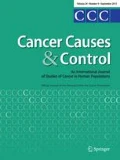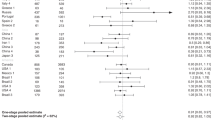Abstract
Objective
To investigate the association between green tea consumption and the risk of endometrial cancer restricted to endometrial endometrioid adenocarcinoma (EEA) using a case–control design in Japan.
Methods
The cases were 152 patients with histopathologically diagnosed EEA, and the controls were 285 healthy women who were matched for age and area of residence with individual cases. The subjects completed a questionnaire regarding health-related lifestyle and reproductive history, and a food frequency questionnaire. Odds ratios (ORs) of EEA for frequency of green tea consumption were calculated by conditional logistic regression analysis.
Results
We observed a significant inverse association between green tea consumption and the risk of EEA with a dose–response relationship. The multivariate-adjusted OR of EEA was 0.77 (95% CI: 0.37–1.58) for those in the second quartile of green tea consumption (5–6 cups/week–1 cup/day), 0.61 (0.30–1.23) in the third quartile (2–3 cups/day), and 0.33 (0.15–0.75) in the highest quartile (≥4 cups/day), as referenced with those in the lowest quartile (≤4 cups/week; p for trend = 0.007). This inverse association was consistently observed regardless of the presence or absence of factors such as obesity and menopause.
Conclusion
Green tea consumption may be associated with a lower risk of EEA.
Similar content being viewed by others
References
National Cancer Institute (2008) A snapshot of endometrial cancer. http://planning.cancer.gov/disease/snapshots.shtml. Accessed 2 Feb 2008
National Cancer Center, Japan. Center for Cancer Control and Information Services (2008) http://ganjoho.ncc.go.jp/professional/statistics/statistics.html. Accessed 2 Feb 2008
Liao CK, Rosenblatt KA, Schwartz SM, Weiss NS (2003) Endometrial cancer in Asian migrants to the United States and their descendants. Cancer Causes Control 14:357–360. doi:10.1023/A:1023925010837
Yang CS, Lambert JD, Ju J, Lu G, Sang S (2007) Tea and cancer prevention: molecular mechanisms and human relevance. Toxicol Appl Pharmacol 224:265–273. doi:10.1016/j.taap.2006.11.024
Frei B, Higdon JV (2003) Antioxidant activity of tea polyphenols in vivo: evidence from animal studies. J Nutr 133:3275S–3284S
Cooper R, Morre DJ, Morre DM (2005) Medicinal benefits of green tea: part II review of anticancer properties. J Altern Complement Med 11:639–652. doi:10.1089/acm.2005.11.639
Zaveri NT (2006) Green tea and its polyphenolic catechins: medicinal uses in cancer and noncancer applications. Life Sci 78:2073–2080. doi:10.1016/j.lfs.2005.12.006
Inoue M, Tajima K, Hirose K et al (1998) Tea and coffee consumption and the risk of digestive tract cancers: data from a comparative case-referent study in Japan. Cancer Causes Control 9:209–216. doi:10.1023/A:1008890529261
Nagano J, Kono S, Preston DL, Mabuchi K (2001) A prospective study of green tea consumption and cancer incidence, Hiroshima and Nagasaki (Japan). Cancer Causes Control 12:501–508. doi:10.1023/A:1011297326696
Sasazuki S, Inoue M, Hanaoka T, Yamamoto S, Sobue T, Tsugane S (2004) Green tea consumption and subsequent risk of gastric cancer by subsite: the JPHC Study. Cancer Causes Control 15:483–491. doi:10.1023/B:CACO.0000036449.68454.42
Kuriyama S, Shimazu T, Ohmori K et al (2006) Green tea consumption and mortality due to cardiovascular disease, cancer, and all causes in Japan: the Ohsaki study. JAMA 296:1255–1265. doi:10.1001/jama.296.10.1255
Xu WH, Dai Q, Xiang YB et al (2007) Interaction of soy food and tea consumption with CYP19A1 genetic polymorphisms in the development of endometrial cancer. Am J Epidemiol 166:1420–1430. doi:10.1093/aje/kwm242
Hirose K, Niwa Y, Wakai K, Matsuo K, Nakanishi T, Tajima K (2007) Coffee consumption and the risk of endometrial cancer: evidence from a case-control study of female hormone-related cancers in Japan. Cancer Sci 98:411–415. doi:10.1111/j.1349-7006.2007.00391.x
Shimazu T, Inoue M, Sasazuki S et al (2008) Coffee consumption and risk of endometrial cancer: a prospective study in Japan. Int J Cancer 18 Aug 2008 (online in advance of print)
Koizumi T, Nakaya N, Okamura C et al (2008) Case-control study of coffee consumption and the risk of endometrial endometrioid adenocarcinoma. Eur J Cancer Prev 17(4):358–363. doi:10.1097/CEJ.0b013e3282f0c02c
Tsubono Y, Ogawa K, Watanabe Y et al (2001) Food frequency questionnaire and a screening test. Nutr Cancer 39:78–84. doi:10.1207/S15327914nc391_11
Ogawa K, Tsubono Y, Nishino Y et al (2003) Validation of a food-frequency questionnaire for cohort studies in rural Japan. Public Health Nutr 6:147–157. doi:10.1079/PHN2002411
Amant F, Moerman P, Neven P et al (2005) Endometrial cancer. Lancet 366(9484):491–505. doi:10.1016/S0140-6736(05)67063-8
SAS Institute Inc (2004) SAS/STAT user’s guide, release 9.1 edition. SAS Institute Inc, Cary
Bokhman JV (1983) Two pathogenetic types of endometrial carcinoma. Gynecol Oncol 15:10–17. doi:10.1016/0090-8258(83)90111-7
Deligdisch L, Holinka CF (1987) Endometrial carcinoma: two diseases? Cancer Detect Prev 10:237–246
Christopher P, Crum KRL (2006) Diagnostic gynecologic and obstetric pathology. Elsevier Saunders, Philadelphia, pp 546–548
Ohta H, Makita K (2000) Horumon hojyu ryouhou. Sanhujinka no jissai (Japanese) 49:1669–1676
Tsubono Y, Nishino Y, Komatsu S et al (2001) Green tea and the risk of gastric cancer in Japan. N Engl J Med 344:632–636. doi:10.1056/NEJM200103013440903
Koizumi Y, Tsubono Y, Nakaya N et al (2003) No association between green tea and the risk of gastric cancer: pooled analysis of two prospective studies in Japan. Cancer Epidemiol Biomarkers Prev 12:472–473
Suzuki Y, Tsubono Y, Nakaya N, Koizumi Y, Shibuya D, Tsuji I (2005) Green tea and the risk of colorectal cancer: pooled analysis of two prospective studies in Japan. J Epidemiol 15:118–124. doi:10.2188/jea.15.118
Kikuchi N, Ohmori K, Shimazu T et al (2006) No association between green tea and prostate cancer risk in Japanese men: the Ohsaki Cohort Study. Br J Cancer 95:371–373. doi:10.1038/sj.bjc.6603230
Suzuki Y, Tsubono Y, Nakaya N, Koizumi Y, Tsuji I (2004) Green tea and the risk of breast cancer: pooled analysis of two prospective studies in Japan. Br J Cancer 90:1361–1363. doi:10.1038/sj.bjc.6601652
Ishikawa A, Kuriyama S, Tsubono Y et al (2006) Smoking, alcohol drinking, green tea consumption and the risk of esophageal cancer in Japanese men. J Epidemiol 16(5):185–192. doi:10.2188/jea.16.185
Luo J, Inoue M, Iwasaki M et al (2007) Green tea and coffee intake and risk of pancreatic cancer in a large-scale, population-based cohort study in Japan (JPHC study). Eur J Cancer Prev 16(6):542–548
Zhang M, Binns CW, Lee AH (2002) Tea consumption and ovarian cancer risk: a case-control study in China. Cancer Epidemiol Biomarkers Prev 11(8):713–718
Acknowledgments
We deeply thank for Dr. Y. Tsubono’s permission to use the FFQ for this study. This study was supported in part by a Grant-in-Aid for Scientific Research on Priority Areas, a Grant-in-Aid for Scientific Research (B) and (C), a Grant-in-Aid for Young Scientists (B), a Grant-in-Aid for Exploratory Research, from the Ministry of Education, Science, Sports and Culture, Japan; a Grant-in-Aid from the Ministry of Health, Labor and Welfare, Japan; the 21st Century COE Program Special Research Grant (Tohoku University) from the Ministry of Education Science, Sports and Culture, Japan; a Grant-in-aid from the Kurokawa Cancer Research Foundation, the Uehara Memorial Foundation, All Japan Coffee Association, and the Third Term Comprehensive 10-year Strategy for Cancer Control from the Ministry of Health, Labour and Welfare, Japan. All the authors of this article have directly participated in the planning, execution, or analysis of this study. There are no financial or other relations that could lead to conflict of interest.
Author information
Authors and Affiliations
Corresponding author
Rights and permissions
About this article
Cite this article
Kakuta, Y., Nakaya, N., Nagase, S. et al. Case–control study of green tea consumption and the risk of endometrial endometrioid adenocarcinoma. Cancer Causes Control 20, 617–624 (2009). https://doi.org/10.1007/s10552-008-9272-0
Received:
Accepted:
Published:
Issue Date:
DOI: https://doi.org/10.1007/s10552-008-9272-0




